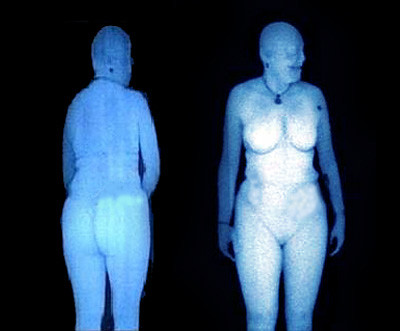Full body scanners introduced to Manchester Airport
Article published: Tuesday, February 9th 2010
Personal privacy was under scrutiny in Manchester last week as the first scanning devices in the city’s airport became compulsory.
 The first passengers to test the devices, which use high frequency radio waves to detect suspicious objects or explosives hidden on a person’s body, passed though Terminal 2 of Manchester Airport last November as part of a trial. However from the start of last week any passenger in the airport could be forced to undergo the scan, provoking calls of civil rights infringement.
The first passengers to test the devices, which use high frequency radio waves to detect suspicious objects or explosives hidden on a person’s body, passed though Terminal 2 of Manchester Airport last November as part of a trial. However from the start of last week any passenger in the airport could be forced to undergo the scan, provoking calls of civil rights infringement.
The scanners produce “millimetre-waves” which work by penetrating clothing before being refracted by the body, producing an image of the person in a similar way to an x-ray. The scanners are currently on a one-year trial period at Heathrow and Manchester Airport, with a further trial expected at Birmingham airport in the near future.
Reports from passengers who have used the scanners claim that it is a quick, non-intrusive procedure and a recent Manchester Evening News poll suggests that a majority of people favour the measure, which is believed will help to curb attacks such as the failed Christmas Day bombing of a flight over Detroit.
However civil rights group Liberty do not agree. Their spokesperson Mairi Rodgers questions if the correct response to the terrorist threat should be new security measures at airports. She said: “Any response to terrorism must be proportionate and respectful of human rights, privacy and equal treatment that governments on both sides of the Atlantic have been all too easily tempted to ignore.”
The introduction followed an announcement by Home Secretary Alan Johnson that the current level of terrorist threat has increased from “substantial” to “severe”, based on intelligence from MI5 agency the Joint Terrorism Analysis Centre.
Campaign groups question the validity of the devices that produce x-ray images as a security measure and argue that the existing arrangements are sufficient. Ms Rodgers asks: “Where is the evaluation of the effectiveness of this highly costly and intrusive technology in the face of the particular threat?”
Could it be that the government are introducing a measure under the banner of terrorist prevention which is actually a means of collecting detailed personal data on citizens? They say not. According to the Department for Transport’s ‘Interim Code of Practice’ on the scanners, “Immediately after the scanning analysis is completed and the passenger moves away from the body scanner, all images of the passenger must be destroyed and irretrievable.” This will silence those who cite data protection issues as a reason to oppose the scanners.
Yet despite any controversy as to the civil rights dimension, it appears likely that the scanners will be introduced across the country following the trials at Manchester and Heathrow.
Samantha Bradey
More: Manchester, News
Comments
No comments found
The comments are closed.



